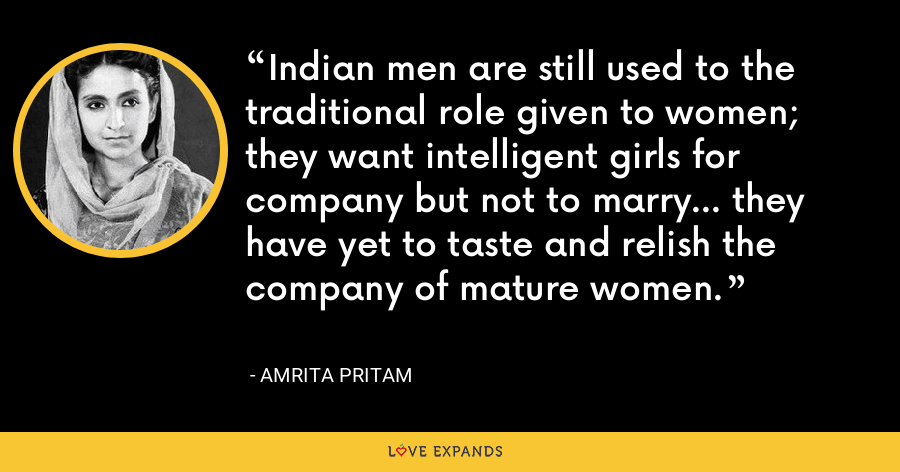The struggle against inherent patriarchy of Indian men – a long road ahead
“Indian men are still used to the traditional role given to women; they want intelligent girls for company but not to marry” – Amrita Pritam
This statement by Amrita Pritam resonates perfectly with the mindset of Indian men even in 21st century. The expansion of educational facilities and the reach of higher education to the farthest corners of the country has brought a very miniscule change to the mindset.
Even today when it comes to dating or hanging out with a girl, the men prefer a more outgoing personality. The men prefer the company of open minded energetic and full of life female companion, but when it comes to settling down and taking the vows of married life, they look for homely girl well versed in the traditional form of life.
Status Quo remains
One wonders why is it so? What is the reason behind this duplicity of a typical Indian men’s behaviour. The reason lies in status quo.
Yes, Indian men are afraid to embrace the change. They had been brought up in a familiar setting where women are performing the traditional roles assigned to them over centuries. That is what they have seen throughout their entire formative years. That image of a women is what they are comfortable with. Be it their mother cooking in kitchen, keeping the household clean, doing the laundry, and so on. These are the tasks or chores, that they have practically watched the women in their family do, the entire life. And not just women in their family, this has been a common sighting for them even in their neighbourhood.
When you have been born and brought up in such an environment this is what one normalises. In such mindset a woman who is free living, outgoing and unconventional is the wrong fit into their familial expectations. Off course they enjoy their company but when it comes to making them part of their family, this men’s suddenly find themselves uneasy to accept the same woman, to fit into the mould they have developed in the minds over the years.
It is akin to fitting a rectangular piece of puzzle into a square frame. The mere thought makes them uncomfortable. Centuries of indoctrination is not an easy opponent to challenge.
The solution ahead
The question that remains is how do we bring that change? How do we shatter this rigid mindset of Indian men?
It is true that with the advent of globalisation and rise in literacy has weakened this thought process to a certain extent. But even today in metros, and even more strongly in tier 2 and tier 3 cities, a typical matrimonial column is always looking for a homely bride.
The First Step
Why has the education not been able to bring a major change in this regard. The answer lies in the quality of our education system. The textbooks of our different educational boards are actually presenting a similar image to the students that they see at their home. When a primary student reads a chapter, where the father is always shown as working outside, while the mother is always shown to be doing the household chores, in both images and text, it only strengthens the already prevalent conditioning of one’s brain. In a nutshell the inherent sexist biases in our textbooks have fed Indian meals that the Indian women are created for these traditional roles only.
This is why the first change that we need to bring, is to make out textbooks more inclusive.
The Second Step
The second important subject that must be covered in our school and college curriculum is gender sensitization. True gender sensitization there is a potential to train the mindset of Indian men to understand everyday problems, sexism and obstacles chased by a woman in and around us. It can help them see, how the men around them are part of the same problem and train their minds to overcome the inherent patriarchal rigidity.
It is a long fight and we will win
I know that these steps are not going to bring an immediate and radical change in the mindset of Indian men, but we have to start somewhere. We have to remember that our fight is against a thousand-year-old patriarchal system, and not necessarily against men. To change such an old system will take time and persistent effort, and we have the potential to do that.
The woods are lonely, dark, and deep,
And I have promises to keep,
Together we will cross them all,
Together we shall make that leap.





